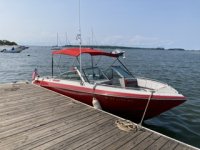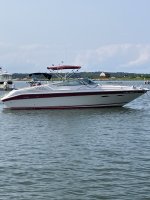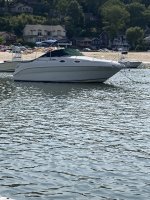If you're in freshwater where are you getting your info about how long raw water cooled engines last in salt?
As far as excessive maintenance/repair in salt water here's what I can tell you that I learned from 3 very good salt water mechanics and my own experience:
With an I/O you have to do what the manufacturer said, winterizing, springizing and the drive R&R yearly. Bellows last approx 10 seasons here at least on the Cobra and Volvo SX models, and these don't have the shift cable bellow failures that Mercs can
Extra maintenance over that in the manuals?
the only thing is changing the exhaust system every 5-7 years.
Want to know how many repairs I've done to the Cobra drive in 20 years?
Zero mechanical, a few seals replaced when I bought it in 2002. Trim lines replaced, 15 years ago. That's it. Original trim rams, trim & tilt pump, no repairs to transom assembly, no water leaks original Y pipe etc.
the only major repair was due to an overheat if that didn’t happen I might still be running the original heads. However judging by the cooling passages of them 6 years ago they could have rusted thru by now. So you run 20 years in salt & then put on a set of reman heads. That job cost $800 in parts.
The other extra work is bottom paint & drive paint. No way around that.
BTW there’s a mechanic over at the hull truth who’s located in the Mediterranean Sea. He has often posted that Many many I/O boats there too some with diesels survive very well. Yes it takes more maintenance. Where I draw the line is cat converter exhaust. No way I’m having an inboard boat with that heat generator bolted onto it, and $6500 parts cost to replace. IMO they are a hazard!
Salt water is not the death of boats. All the rot my boat had is from rain fresh water!
Next boat for sure will be 4 stroke outboard only because I will not under any circumstances have cat exhaust in a fiberglass boat that depends on a rubber impeller. No, No and NO!
My ultimate boat is a Steiger Craft 21 Miami with a 200 hp outboard.
























